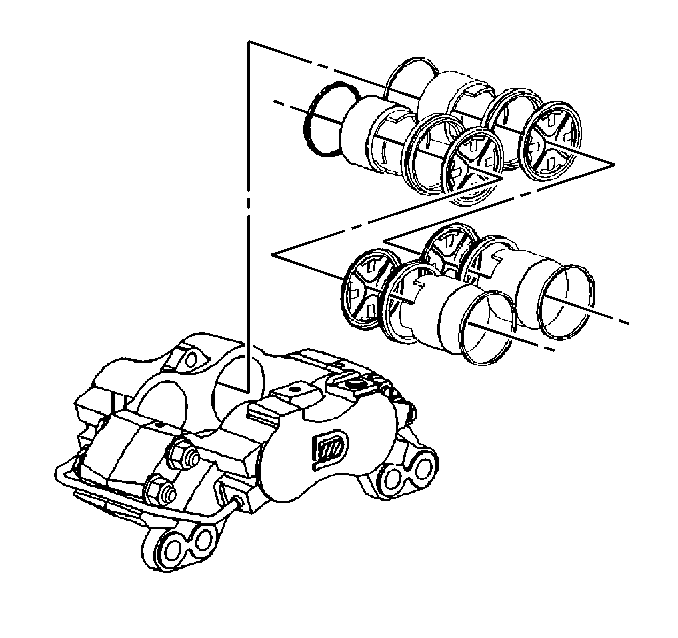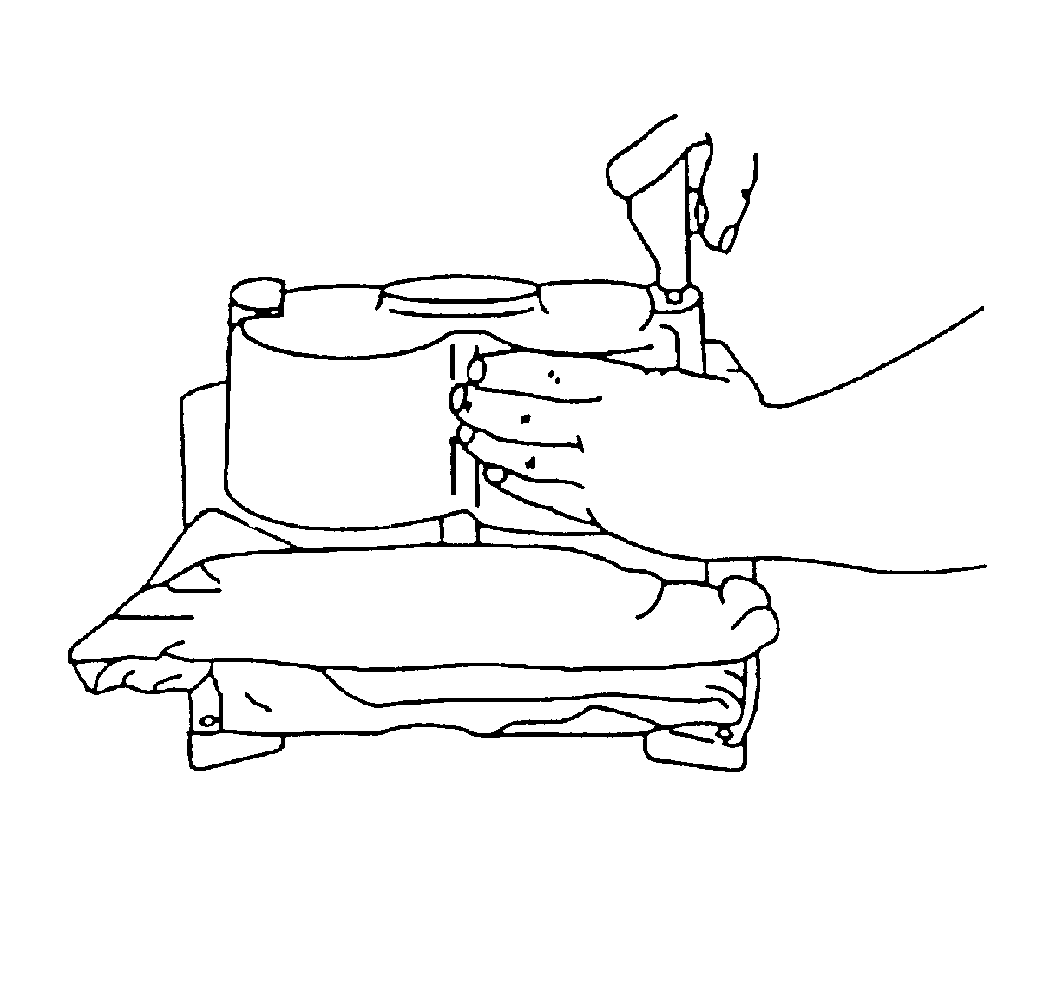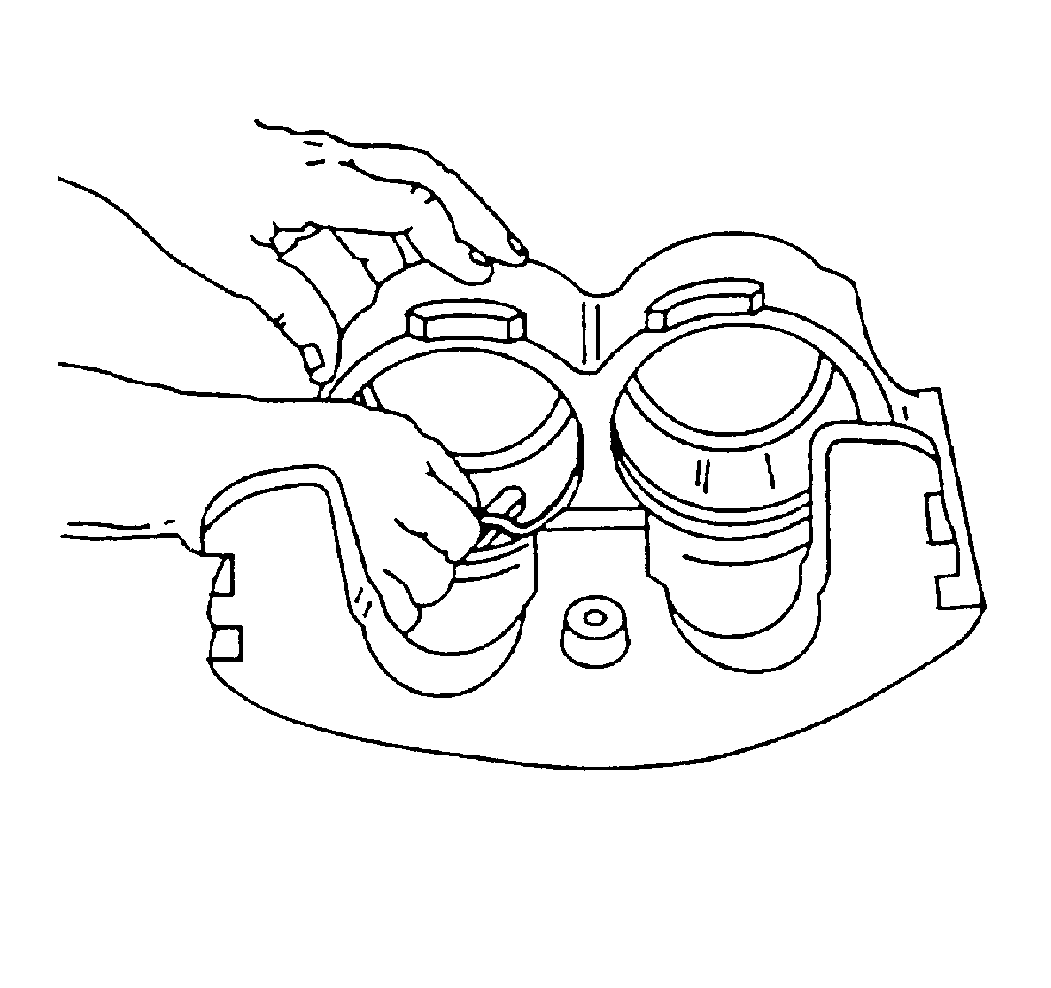Brake Caliper Overhaul Fixed Mount
Caution: Refer to Brake Dust Caution in the Preface section.
Caution: Refer to Brake Fluid Irritant Caution in the Preface section.
Disassembly Procedure
Notice: Do not loosen or remove the four bolts in the brake caliper bridge area.
The brake caliper bridge bolts may become loose. If the bridge bolts become
loose, replace the brake caliper. Failure to follow these instructions will
cause damage to the brake caliper.
- Remove the brake fluid from the brake caliper.
- Clean the exterior of the brake caliper. Use denatured alcohol or suitable, non-petroleum based solvent.

- Remove the heat shields.
- Place a block of wood equal to the length of the brake pad lining inside the caliper bridge area between the pistons.

Caution: Do not place your fingers in front of the piston in an attempt to catch
or protect it when applying compressed air. This could result in serious injury.
Notice: Use only enough air to ease the piston out of the bore. If the piston
is blown out, even with the padding, it can be damaged.
- Direct compressed air in to caliper brake fluid inlet in order to remove the pistons from the caliper bore.
Use just enough air to ease the pistons out. Do not use more than 620 kPa (90 psi).
| 5.1. | If only some of the pistons are removed, partially reinsert the pistons. |
| 5.2. | Block the reinserted pistons in place. |
| 5.3. | Apply air pressure again in order to remove the remaining pistons. |
- Remove the dust boots using a screwdriver.

- Remove the piston seals from the groove in the caliper bore using a pointed piece of wood or plastic.
- Remove the brake caliper bleeder valves.
Notice: Do not use mineral base cleaning solvents such as gasoline, kerosene,
carbon tetrachloride, acetone, or paint thinner to clean the brake caliper.
These solvents will cause rubber parts to become soft and swollen in an extremely
short time.
- Clean all of the parts in denatured alcohol or suitable, non-petroleum based solvent.
- Blow out all of the passages in the brake caliper housing and the brake caliper bleeder valve.
Use dry, filtered, non-lubricated compressed air.
- Clean the brake caliper support rail surfaces with a wire brush.
- Inspect the support rail surfaces for rust or corrosion.
- Inspect the brake caliper housing for cracks or other damage. Replace the caliper housing if necessary.
- Inspect the outside diameter of the pistons. Replace the faulty pistons if you find any of the following conditions:
Important: The outside diameter of the piston is the primary sealing surface of the brake caliper. The piston diameter is manufactured to very close tolerances. Do not refinish the piston diameter. Do not use abrasives on the
piston diameter.
- If you find any surface faults, replace the piston.
- Inspect the caliper bore. Replace the caliper if you find any of the following conditions:
Important: Do not use any abrasive on the caliper bore, including emery cloth.
- Polish out stains and minor corrosion from the caliper bore with crocus cloth.
If you cannot remove the stains and corrosion with crocus cloth, replace the caliper.
- Clean the caliper bore after using the crocus cloth.
Assembly Procedure
- Place the brake caliper housing on a clean work bench with the open ends of the caliper bores facing up.
- Dip the piston seals in clean brake fluid.

- Gently work the piston seal around the seal groove of
each caliper bore with a finger.
- Ensure that the seal is fully seated in the groove.
- Ensure that the piston seal is not twisted or rolled in the groove.
- Lubricate the pistons and the caliper bores with clean brake fluid.
- Gently push the piston into the caliper bore.
- Rotate the piston slightly in order to prevent dislodging the piston seal.
- Push the piston to the bottom of the caliper bore.
- Press the new dust boot into the counterbore in the brake caliper housing.
The dust boot overlaps the stepped edge of the piston.
- Install a new heat shield on the piston.
| 11.1. | Align the slots with the castellations on the piston. |
| 11.2. | Press down until the 4 fingers for the heat shield engage the piston inside wall. |
Notice: Refer to Fastener Notice in the Preface section.
- Install the brake caliper bleeder valve.
Tighten
Tighten the valve to 17 N·m (13 lb ft).




